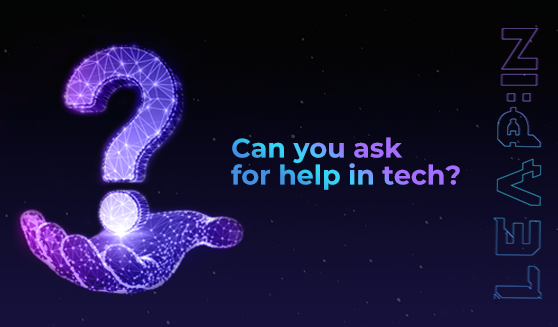
If you’re missing the excitement of #LEAP23 as much as we are, you’re in the right place – discover more from our incredible keynote speakers in our weekly newsletter.
subscribe
This week we’re quoting…
Ioana Matei (Head of Emerging/Immersive Technologies – Metaverse/Web3)
What Matei said:
“Get connected with like-minded people. Use your network to learn, create opportunities and ask for help. Do ask for help, you will be surprised at the support you will receive.”
It’s not just about ego
Matei’s advice was aimed at women in tech. But beyond the gender divide, it got us thinking about whether or not the tech industry fosters a culture in which entrepreneurs feel like they can ask for help.
We don’t actually have an answer to that question. What do you think? When you’re facing a challenge you can’t overcome on your own, can you reach out to colleagues in tech and ask for assistance?
One thing we do know is that all of us have a tendency to stand in our own way when it comes to admitting we can’t do something on our own. Part of that might come down to ego – or at least, that’s what success literature tells us. But the culture we’re working within also plays a big part.
So we decided to try and find out which industries make it the easiest for people to ask for help. And you know what we found? Almost nothing. We found loads of anecdotal evidence on personal blogs about professionals in certain industries, but no credible research to suggest that some industries are more supportive than others.
It was a bit of an anti-climax. But we didn’t stop there.
From psychology to business growth
Thwarted by the dead end we hit on our first path of enquiry, we did a U-turn and jumped back into psychology: to explore why it’s absolutely OK for tech innovators to ask for help.
This is what we found:
1. People often don’t feel like you’re imposing on them when you ask for help.
This is important – because worrying you’ll be seen as annoying is a big barrier when you’re seeking support. As social psychologist Xuan Zhao explained to Stanford News, we often underestimate how willing (or even eager) people are to help others, and how good it makes them feel to do so. Rather than feeling like they’re being imposed upon, people like being asked for help.
A research review by Vanessa Bohns (Professor of Organisational Behaviour at Cornell University) found that people provided assistance to strangers 48% more often than the seekers-of-help expected. Bohns also found that help-seekers underestimate how much effort people will put in if they do offer help – in fact, people are much more likely to go to great lengths to help us out than we think they are.
2. Help generates a natural high.
Countless studies now show that helping people gives the helper a psychological benefit. This 2017 study in Switzerland found that something as simple as pledging to spend just a small amount of money on someone else creates more internal happiness than deciding to spend that same money on themselves.
In other words, helping isn’t ever exactly altruistic. People know that if they help someone else, it’ll make them feel good. And everyone wants to feel good.
3. People want to feel effective.
Psychology suggests that people want to be effective – so when you ask for help, it’s really important to make it clear you’ll share the results of that help with the helper. Promise to keep them up to date on the impact of their actions, and they’ll be more excited about the prospect of giving you their aid.
One study, by Adam Grant (Professor at the Wharton School, University of Pennsylvania) found that when employees at a call centre were visited by one of the beneficiaries of their outbound calls; and the beneficiary spoke to them about how much their work was supporting him
Our point is…
Our research dead end left us a bit deflated. We want to know how supportive and collaborative the tech industry is. We want to know how easy it is for you, LEAP readers, to ask for help.
At LEAP 2023 we witnessed an incredible level of collaboration, idea-sharing, and real-time mentorship. We saw startups gain the support they need to reach new heights, and we listened in awe as innovators helped one another solve their biggest problems.
And we want the industry to be like that all the time – so that tech can enable a better future. So our point is: if you need help to grow your business or bring your idea to life, ask for it. You might be surprised by how willing people are to respond.
Read our interview with Ioana Matei: No experts, but huge opportunity
subscribe
This week we’re also quoting…
Mohammed Alzubi (Founder and Managing Partner at Nama Ventures)
What Alzubi said:
Err, he technically didn’t really say anything. But his BFF:ChatGPT said this:
“I have learned that entrepreneurship is a team sport. To achieve greatness in a startup, it is essential to be able to assemble a team with complementary skill sets and role clarity.”
OK. But should ChatGPT be part of your team?
Let us explain. We sent some questions to Alzubi, and he used ChatGPT to answer those questions. It sparked several interesting threads of discussion among our team – and this particular statement about entrepreneurship as a team sport gave us a lot to think about.
If your goal is to build a team that can enable your startup to achieve greatness, then should ChatGPT (or another AI model) be a part of that team?
Or more specifically, is ChatGPT currently capable of greatness?
We’re kind of obsessed
Here’s the thing: ChatGPT isn’t that reliable yet. If you’re going to use it to, say, respond to interviews or produce digital content for your business, you’ve got to comb through that content carefully to make sure it’s good enough.
But we’re kind of obsessed with ChatGPT. Because we have no doubt that AI is going to be a big part of all of our futures – and as a tool, ChatGPT has the capacity to be creative. Which is huge.
It’s been hailed as a tipping point for AI because it’s genuinely useful, and has a vast number of potential knock-on effects that could change the way industries and organisations work. Schools and universities, for example, are being urged to review the way they handle homework and essays because students can now access a tool that can write a completely unique essay on any subject for them.
Maybe not greatness just yet – but it can save you time
Alzubi has made ChatGPT a part of his team. And the response it sent to our interview questions was good – but it’s got a way to go before it’ll achieve creative greatness.
It did, however, save him time. And it could do the same for you. So perhaps right now, by streamlining some of your work and doing simple tasks (including writing tasks) for you, it could help you achieve greatness by giving you more time to…be great.
Read the interview: Meet Mohammed Alzubi and his BFF:ChatGPT
subscribe








